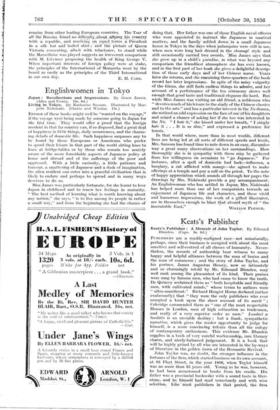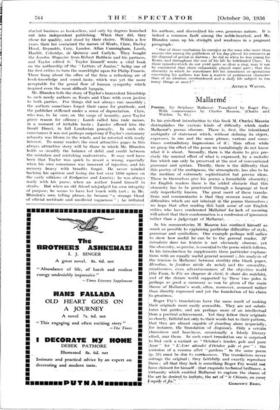Keats's Publisher : A Memoir of John Taylor. By Edmund
Keats's Publisher
Blunden. (Cape. 8s. 6d.) .
PCBLISHERS are a readily-maligned race—not unnaturally, perhaps, since their business is occupied with about the most sensitive and self-centred of all classes of humanity. Never- theless, the records of authorship bear witness to many happy and helpful alliances "between the man of brains and the man of commerce ; and the story of John Taylor, and his partner, James Augustus Hessey, now so intimately and so charmingly retold by Mr. Edmund Blunden, may well rank among the pleasantest of its kind. Their praises were sung by famous men, who had cause to know the truth. De Quincey acclaimed thein as "both hospitable and friendly men, with cultivated minds," whose terms to authors were ultra-munificent" Richard Hengist Home declared (rather exuberantly) that " they were the only publishers who ever accepted a book upon the sheer account of its merit " ; Coleridge commended them as " oue of the most respectable Houses in London, men of high estimation as tradesmen, and really of a very superior order as men." Laudari a laudalis is an enviable destiny ; but a frank, sympathetic narrative, which gives the reader opportunity to judge for himself, is a more convincing tribute than all the eulogy of contemporary enthusiasm. This evidenee Mr. Blunden supplies in a book of very careful workmanship, rare literary charm, and nicely-balanced judgement. It is a book that will be highly prized by all who are interested in the by-ways of literature in the golden dawn of the Romantic Revival.
John Taylor was, no doubt, the stronger influence in the fortunes of the firm, which started business on its own account, at 93 Fleet Street, -in the year 1806, when Taylor himself was no more than 25 years old. Young as he was, however, he had been accustomed to books from his cradle. His father was a provincial bookseller with a sound taste in liter- ature,. and be_ himself had read voraciously and with wise selection. Like Most publishers in that period, the firm stinted business as booksellers, and only by degrees launched out into independent publishing. When they did, they chose for quality, and stood by their choice. Within a few years their list contained the names of heats, Clare, barley Hood, Reynolds, Cary, Landor, Allan Cunningham, Lamb, Hazlitt, Coleridge, de Quincy and Carlyle. They bought the London Magazine from Robert Baldwin and his partners, and Taylor edited it. Taylor himself wrote a vital book on the authorship -of-the " Letters of Junius'," bake 'one of the first critics to turn the searchlight upon Sir Philip Francis. There hung about the office of the firm a refreshing air of book-knowledge and sound ,taste, which was yet, the more acceptable for the genial flow of human sympathy which inspired even the most difficult bargain.
Mr. Blunden tells the story of Taylor's benevolent friendship to such needy authors as Keats and Clare with even justice to both parties. For things did not always run smoothly ; the authors sometimes forgot their cause for gratitude, and the publisher' stiffened under a sense of depreciation. Clare, who was, to be sure, on the verge of insanity, gave Taylor grave reason for offence ; Lamb- called him rude names, in a moment of irritable haste ; Landor offered him the Insult Direct, in full Landorian panoply. In such cir- cumstances it was not perhaps surprising if Taylor's customary urbanity was blown to the winds, and he retorted with ready interest. To many readers the most attractive pages in this always attractive story will be those in which Mr. Blundell holds so steadily the balance of debit and credit' between the mistaken and mistaking malcontents. It may well have been that Taylor was quick to resent a wrong, especially when his own eonseienee was innocent of injustice, and his memory heavy with benefits forgot. He never minded backing his opinion and losing (he lost over 1100 apiece on the early editions of Endfpnion and Laurin); he was always ready with his purse, when an author found himself in straits. But when an old friend misjudged his own integrity of purpose, he seems to have lost touch with tact ; in Mr. Blunden's own telling phrase, he became "a strange blend of official rectitude and unofficial vaguenesS " ; he irritated
• ammormumermsemarom
• The • ▪ BROTHERS ASHKENAZI
I. J. SINGER • A great novel. 8s. 6c1. net • "Abundance of life, of harsh and restless • energy undeniably impressive "
• —Times Literary Supplement
HAWS FALLADA
• OLD HEART GOES ON ■ IN A JOURNEY
S I A novel 7s. 6d. net
•
■
•
■ • ■ " This engaging and often exciting story" • —The Times
I DECORATE NY HONE
DEREK PATMORE Illustrated 8s. 6d. net Intimate and practical advice by an expert on decorating and modern taste.
■ • S • •
■
• •
inisommIDUTHAIIImmun
•
■
his authors, and discredited his own generous nature. It is indeed a common fault among the noble-hearted, and Mr. Blunden sums up his strength and weakness in a pregnant paragraph :
" Out of those confusions he emerges as the man who more than anyone else among the publishers of his day placed his resources at the disposal of genius in distress ; he did so when he was young for Keats, and throughout the rest-of-big life "Se beiriended Clare. In those episodes winch do not yield quite so Clear a ring, may it not be considered that sheer exhausticih played some part ; that the obscurity in which he abmetiimes raft his intentions or operations concerning his authors was less R:rilatter• of perinanent character than of an idealism overburdened and a daily life subject to too many things at once ?"
- ARTHUR WAUGH.





















































 Previous page
Previous page